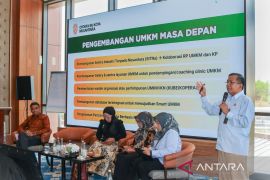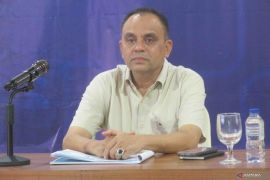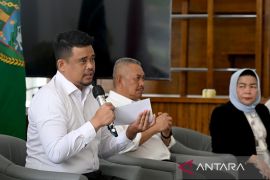Trees can make urban environments more beautiful, and help cool cities by providing shade and releasing water vapors.Jakarta (ANTARA News) - The National Tree Planting Day commemoration in Indonesia, to be held November 28, 2015, is considered an important opportunity to sensitize the public about the importance of trees to human life.
National Tree Planting Day is expected to serve as a celebration for all Indonesians to appreciate the great benefits that trees provide them, including clean air, valuable resources, a beneficial ecosystem, and a lasting legacy for future generations.
Environmentalist Mohammad Hasroel Thayib of the University of Indonesia (UI) remarked here on Monday that trees are important for the environment, good for society, good for the economy, and good for all people.
"Commemoration of National Tree Planting Day is important to sensitize the public about the importance of trees," he said, adding that the public must return to natural ecosystems, and publications about the importance of trees should be distributed so that they understand.
According to Thayib, issues related to the importance of trees should be raised in seminars and publicized in the media so that the public understands how to keep and maintain trees.
In terms of health, trees can provide the public with the air they breathe, medicine and shade from harmful ultraviolet rays, because the presence of green spaces has been positively linked to longevity and recovery rates of hospital patients.
Thayib explained that trees can make urban environments more beautiful, and help cool cities by providing shade and releasing water vapors.
Trees can also help the public in the fight against pollution by acting as carbon storage banks, reducing erosion, improving water quality, and increasing rainfall.
Nirwono Joga, an observer of urban planning at the University of Trisakti, has said that the indiscriminate felling of trees is harming humans, both biologically and economically.
Joga noted that the indiscriminate harvesting of trees will affect the ecosystem, and when the natural balance is disturbed, the impact will be felt by human beings.
Based on the results of his personal research, Joga said that one single tree, if converted into rupiah, can produce oxygen amounting to Rp1,174 million per day.
"That is for one tree only. If one thousand trees are felled in a single year, large losses can be unimaginable," he explained.
He pointed out that with no trees in a neighborhood, people will easily sicken, and health care costs will be more expensive due to long-term policies that are not pro-environment.
"Ironically, people usually make a big fuss when fuel prices are raised, but they are silent when a thousand trees are felled indiscriminately. In fact, the trees' function is to absorb water and provide oxygen for free," Joga noted.
In line with Presidential Decree No. 24/2008, the government declared November 28 as Indonesian Tree Planting Day (HMPI) and December as National Planting Month (BMN).
Indonesia has managed to reduce the deforestation rate from 3.5 million hectares per year to 450,000 hectares per year.
The country is working closely with Sweden to preserve the environment through the Reducing Emissions from Deforestation and Forest Degradation (REDD) Plus programme.
Since 2010, Indonesia has been planting one billion trees annually. The country has also prohibited the conversion of peat land.
The government has further instructed schools to include courses on environmental conservation.
When commemorating National Tree Planting Day in November last year, President Joko Widodo (Jokowi) planted some 37,000 tree seedlings, including teakwood tree.
According to Environmental Affairs and Forestry Minister Siti Nurbaya, "Preserved Forests to Support Food Sovereignty, Water and Renewable Energy" was the theme of last years National Tree Planting Day activities.
At that time, the minister invited and encouraged the public to preserve the ecosystem in order to improve the quality of the environment and to provide food, protect water and to obtain renewable energy.
The government has also empowered those inhabitants living near forest areas to increase their income through community-based forestry programs, according to Nurbaya.
The government has so far allocated 328 thousand hectares for community forests, 318 thousand hectares for rural forests, 194 thousand hectares for peoples' tree forests, and 280 thousand hectares for people partnership forests, involving 3,700 community groups across the country.
As part of National Tree Planting Day activities, some 1,3 billion trees were planted in 2010, 1.5 billion trees in 2011, 1.6 billion in 2012, and 1.8 billion in 2013, and in 2014, some two billion trees were to be planted.
President Jokowi, on the occasion, presented awards to governors, district heads and mayors who came out as winners in a national "one billion tree planting" contest during the previous year.
Simultaneously, thousands of trees were also planted at various locations in Indonesia on the same day during tree planting day and month commemorations.
In Batam, Riau Island Province, some 500 trees were planted by local officials, military personnel and students.
In West Papua Province, the local administration has planted 200 thousand trees since January 2014, according to a local official.
The trees were planted as part of the province's One Billion Tree Planting Movement activities, Hendrik Runaweri, head of the West Papua forestry and plantation office, said in the provincial capital of Manokwari.
The trees were planted in various districts and cities, in particularly in the Remu protected forest in Sorong City and in a mangrove forest located in Tambrauw District, he stated.
The movement was aimed at rehabilitating forest and arid areas to support a self-sufficient food program in West Papua Province, he explained.
The provincial administration has also encouraged inhabitants of West Papua to plant as many trees as possible to protect forests.(*)
Reporter: Otniel Tamindael
Editor: Heru Purwanto
Copyright © ANTARA 2015











